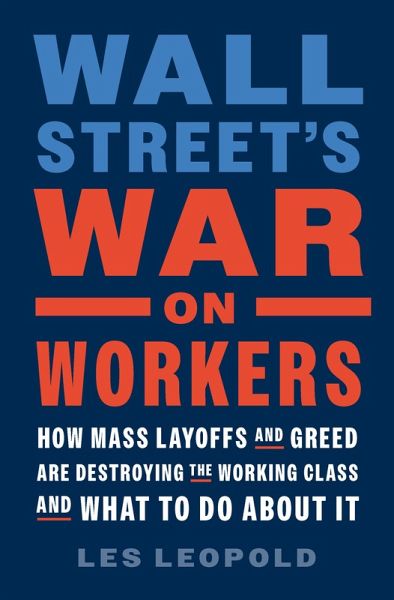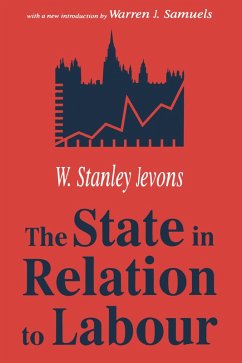
Wall Street's War on Workers (eBook, ePUB)
How Mass Layoffs and Greed Are Destroying the Working Class and What to Do About It
Versandkostenfrei!
Sofort per Download lieferbar
15,95 €
inkl. MwSt.
Weitere Ausgaben:

PAYBACK Punkte
8 °P sammeln!
2024 Foreword INDIES Book of the Year Awards Finalist for Political and Social Sciences "This book gave me a new lens to see the world."-Robert Krulwich, former co-host of WNYC's Radiolab Addressing the pressing issues affecting everyday Americans during an election year is essential-and one of our nation's most profound challenges is the devastating impact of mass layoffs. Layoffs upend people's lives, cause enormous stress, and lead to debilitating personal debt. The societal harm caused by mass layoffs has been known for decades. Yet, we do little to stop them. Why? Why do we allow whole co...
2024 Foreword INDIES Book of the Year Awards Finalist for Political and Social Sciences "This book gave me a new lens to see the world."-Robert Krulwich, former co-host of WNYC's Radiolab Addressing the pressing issues affecting everyday Americans during an election year is essential-and one of our nation's most profound challenges is the devastating impact of mass layoffs. Layoffs upend people's lives, cause enormous stress, and lead to debilitating personal debt. The societal harm caused by mass layoffs has been known for decades. Yet, we do little to stop them. Why? Why do we allow whole communities to be destroyed by corporate decision-makers? Why do we consider mass layoffs a natural, baked-in feature of modern financialized capitalism? And what are our elected officials going to do about it? In Wall Street's War on Workers, Les Leopold, co-founder of the Labor Institute, provides a clear lens with which we can see how healthy corporations in the United States have used mass layoffs and stock buybacks to enrich shareholders at the expense of employees. With detailed research and concise language, Leopold explains why mass layoffs occur and how our current laws and regulations allow companies to turn these layoffs into short-term financial gains. Original and insightful, Wall Street's War on Workers places US labor practices in the broader context of our social and political life, examining the impact financial strip-mining and legalized looting are having on party politics, destroying the integrity of democratic institutions. Leopold expertly lays out how the proliferation of opioids coupled with Wall Street's destruction of jobs in West Virginia, Pennsylvania, Michigan, and Wisconsin have led to widespread mass layoff fatalism. Democrats have unarguably lost the longstanding support of millions of urban and rural workers, and Leopold points out how party leaders have been wrong about the assumption that the white working class is becoming less progressive and motivated to abandon the Democratic Party by reactionary positions on divisive social issues. With deep analyses, stark examples, and surprisingly simple proactive steps forward, Leopold also asserts that:
- Surviving and thriving in a competitive global economy does not require mass layoffs.
- A new virulent, financialized version of American capitalism is policy driven.
- To end mass layoffs, Wall Street's domination of our economy must end.
- The accepted "wisdom" about white working-class populism is wrong.
- Ending stock buybacks and changing corporate officers' pay structures could eliminate mass layoffs.
- Mass layoffs are not the result of inevitable economic "laws" or new technologies like artificial intelligence.
Dieser Download kann aus rechtlichen Gründen nur mit Rechnungsadresse in A, B, BG, CY, CZ, D, DK, EW, E, FIN, F, GR, HR, H, IRL, I, LT, L, LR, M, NL, PL, P, R, S, SLO, SK ausgeliefert werden.













